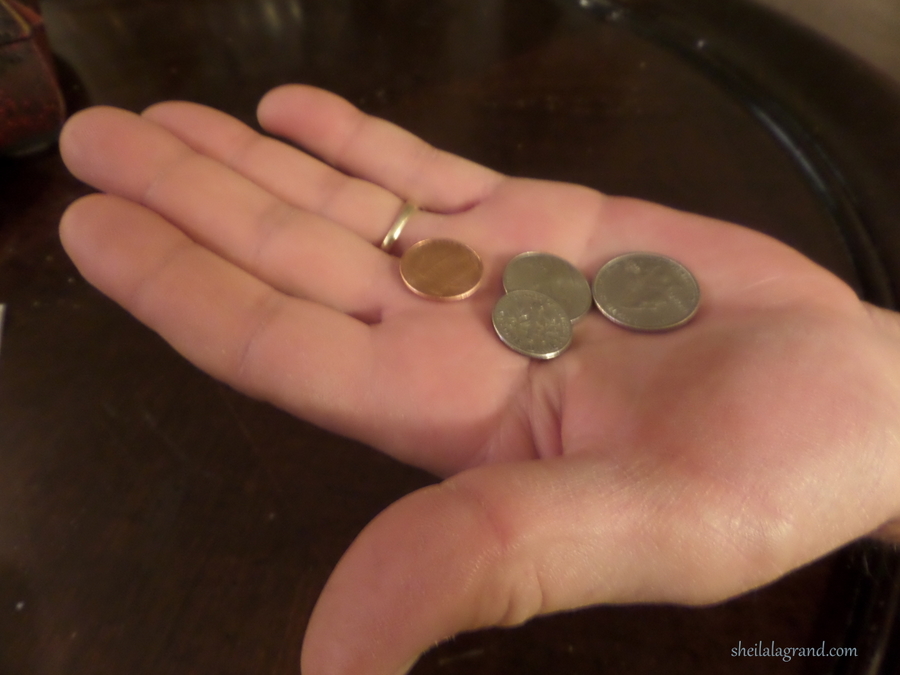Why to Assume Good Faith
I asked a coworker to go to the bank a few weeks ago. I was sprinting to meet a hard deadline and I needed to replenish our petty cash. My coworker graciously agreed, so I handed him the items for deposit and the check for the cash we needed and dove back into my big project.
He knocked at my door when he returned and handed over the cash and the deposit receipt. I thanked him.
“I have a question,” he said, in that tentative voice that means I know you’re really busy and I don’t want to bug you.
“Sure,” I said, putting on a smile that means I’m never too busy to address a question.
“So I noticed,” he said, “that you only got one quarter, one dime, one nickel, and one penny. Does that work well for you to only keep one of each coin?”
I laughed. “Oh, no,” I said, “that’s just a coincidence. When I reconcile, I start with the amount we replenish up to, then I add up all the receipts for disbursements (I use words like disbursements in the office), then I count the cash to confirm it’s all accounted for, and then I issue a check for the amount we’ve disbursed since I last refilled the cash. This time it just happened to be that the amount ended in .41.”
He was nodding before I’d finished my spiel. That makes perrrrrrrrrrrrfect sense, he said, nodding. I couldn’t see how having just one of each denomination would work. We chuckled together; he returned to his office and I returned to my deadline.
But here’s the thing that stuck with me: We both saw the exact same “evidence,” (the amount of the check) but my coworker drew a completely erroneous conclusion from that evidence.
Which brings me to the point: If it is this easy to draw a false conclusion from something seen when the stakes are vanishingly small, how much easier is it when lives are on the line, or reputations, or futures?
Right about here is where good faith comes into the picture. When I was a brand new graduate student in a highly competitive department (is there any other kind of graduate department?), a seasoned colleague offered me advice that probably saved me. In an environment where it might have been easy to slip into some paranoid delusion that your colleagues were after you, he said to me, straight out, before I had a chance to take a single step down the delusional path:
Assume good faith, he said. Unless you know for a fact that someone is trying to undermine you, assume that they’re not.
I know I slept better with that bit of wisdom tucked under my belt.
We’ve all seen those tests where some “bad guy” bursts into the room and fakes a robbery, then every “witness” is interviewed, often with hilarious variance in what they “see.” Reasonable people can disagree. Reasonable people can watch the same event and have completely different, and sometimes opposing, recollections of what they saw.
That’s how we work. We’re not HD cameras. We’re humans. And we bring our own ways of seeing, our own history, into every lived moment.
I’m not totally naive. I get it that spin is a real thing. I understand that people misrepresent things on purpose to further ends they prefer. People lie. That’s no news flash.
I’m not talking about spin. I’m talking about genuine differences in perception. Sometimes that truth, that you and I can watch the same event unfold before us and remember differently about what we saw? Sometimes I lose that thought like a baseball in the stadium lights.
I don’t know if we can fix anything by assuming good faith. I don’t know if we can relieve some of the pain and tension that surrounds tragic events if we start from a place of That’s how it appeared to that other person instead of they’re lying to obstruct justice.
But I think it might be worth a try. What do you think?
The naive inherit foolishness,
But the sensible are crowned with knowledge.Proverbs 14:18 (NASB)





What a good word – assume good faith. I do try to do that – and I think it makes life more enjoyable and doable! Thanks, Sheila.
For a three-word concept, it’s something, isn’t it? I still lean back on that, 30 or so years later.
Wow, Sheila, a BIG story from small change. I love the way God uses even the littlest things if we are listening. 🙂 Thank you.
Thanks, Jody! I love it too. 🙂